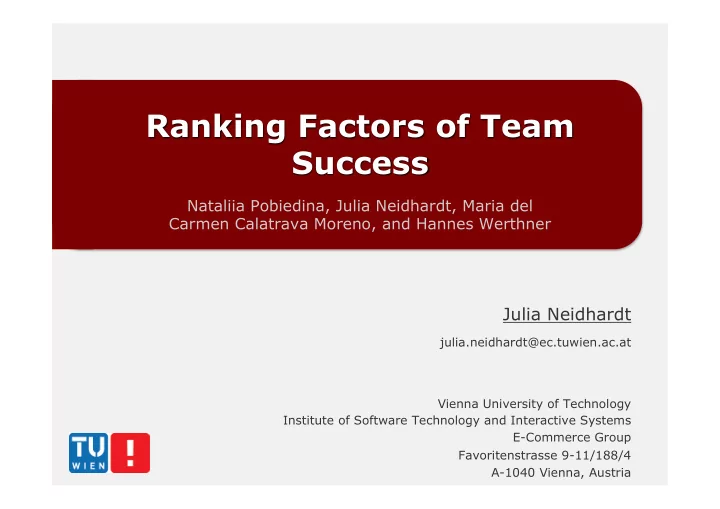

Ranking Factors of Team Success Nataliia Pobiedina, Julia Neidhardt, Maria del Carmen Calatrava Moreno, and Hannes Werthner Julia Neidhardt julia.neidhardt@ec.tuwien.ac.at Vienna University of Technology Institute of Software Technology and Interactive Systems E-Commerce Group Favoritenstrasse 9-11/188/4 A-1040 Vienna, Austria
Agenda n Background and Motivation n The Game and Its Community n The Dataset n Factors of Team Success n Ranking Factors of Team Success n Conclusion and Future Work 2
Background and Motivation n Vast amount of data on the Web allow for observing social interactions on a large scale n We want to study cooperation within teams and factors of team success n For this we use the multiplayer online game Dota 2 n Here players are always assigned to a team with common goals and interest 3
The Game and Its Community n Multiplayer Online Battle Arena game by Valve n Two teams of five players n Each player controls a “hero” that evolves through destruction of enemy forces n One match: on average 45 minutes n Steam platform: social network around Dota 2 http://www.dota2wiki.com/wiki/Dota_2_Wiki, 01/13 4
The Game and Its Community (2) n Heroes are unique characters: l 66 distinct heroes l Through combination of initial attributes heroes are suited for Lina different strategies (“roles”) Class: Intelligence Strength: 18 n Crucial : Strategies should be Agility: 16 chosen based on all heroes in Intelligence: 27 the team Role: Nuker Disabler Support http://www.dota2wiki.com/wiki/Dota_2_Wiki, 01/13 5
The Dataset Dota2 Web API Steam Web API à For our analysis: 87,204 matches played by 138,101 individuals
Factor 1: Players’ Experience Win? #Previous #Previous Time Played … #Deaths Played Matches Won Matches (min) 0 10 7 320 25 Logistic regression Experience score for each player in a team Average of experience à Result: Team’s à scores of team members experience score has a high impact Team’s experience on team success score ( p<0.007 ) 7
Factor 2: Selected Heroes Win? Strength Agility Intelligence … Attack Range 1 18 16 27 625 Logistic regression Score for each hero Average of scores of heroes in a team à Result: Team hero à s c o r e h a s a h i g h i m p a c t o n t e a m Team’s hero score success ( p< 1.8 × 10 -6 ) 8
Factor 3: Friendship Ties 3 Team’s score: 3 1 2 (maximum of team members’ friends) 2 0 à Result: Number of à For each player: number of friends within the team friends (on Steam platform) has a high impact on team within the team success ( p< 2.2 × 10 -16 ) 9
Factor 4: National Diversity n Number of distinct countries in a team n Not all countries know à filter dataset n Result : Teams with one or two countries are more likely to win than teams with three or more countries ( p<0.04 ) 10
Factor 4: National Diversity (2) n Next step: subdivision of matches according to their difficulty , i.e., low, normal, high. Results : Difficulty Low Medium High p-value <0.004 0.184 0.421 à Teams perform better if members are only from one or à two countries; in particular if players are not so advanced 11
Ranking Factors n Quantification of influence of different factors l We exclude Factor 4 (smaller dataset, low significance level) Win? Factor 1 Factor 2 Factor 3 1/0 Team Experience Score Team Hero Score Maximum # of Friends Logistic regression Fitted Model Goodness-of-Fit Tests Ranking of Factors 12
Ranking Factors (2) Ranking χ 2 Df p-value Maximum number of Factor 3 210.6 4 <2.0 × 10 -44 friends : measures the social ties inside the team Team hero score : is Factor 2 89.8 1 <2.7 × 10 -21 related to the chosen characters Team experience score : Factor 1 72.7 1 <1.5 × 10 -17 aggregates the experience of the team members (Analysis of variance, Type III test with likelihood-ratio χ 2 statistics) 13
Ranking Factors (3) n Model Summary: ***p<0.01 win Coefficient Std. Error constant -0.067*** 0.01 max # friends = 4 0.283*** 0.026 max # friends = 3 0.191*** 0.019 max # friends = 2 0.108*** 0.014 max # friends = 1 0.038*** 0.012 team hero score 0.16*** 0.017 team experiences score -0.144*** 0.017 Number of Observations: 174,404 14
Conclusion and Future Work n Data from online games can be used to infer social behavior pattern n Results imply that friendship ties and strategy of the entire team are more crucial than experience of players n Future work: l Extent the model to account also for other factors l Introduce more sophisticated measures of team experience and role distribution l Apply network analysis to study friendship ties l Take into account cultural distance 15
Recommend
More recommend